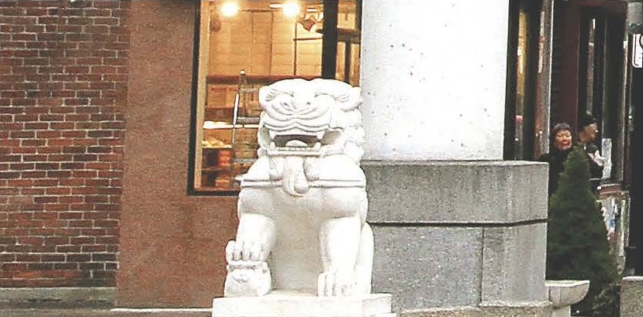
After a very long delay, twin lions will be returned to Chinatown. They will guard a new walkway along Harrison Avenue and a plaza at the junction with Essex Street.
The statues, known as guardian lions, fu lions, or sometimes incorrectly as “foo dogs”, are white marble. They’ll greet pedestrians from atop granite pedestals and flank the northern entrance to New England’s best known Chinese American urban enclave.
A spokesperson for the city’s Public Art Commission said on November 13 that the installation date was still being finalized.
Because
COVID-19 precautions will likely extend into next spring, there are
currently no plans for a public event to celebrate the lions’ return.
After
more than a decade in limbo, the Boston Public Art Commission planned
to have the lions enthroned by November 2019. But preliminary work
revealed that the ground was unsuitable for supporting the statues, said
to Karin Goodfellow, director of the Public Art. Stronger bases are
being prepared for the pedestals, at the recommendation of the project
conservator.
The site is a block
east from the Chinatown MBTA station, and two blocks northwest of the
Chinatown Gate. Taiwan gave Boston four original lions, pedestals, and
the gate, which was completed in 1982. During the Big Dig (1991—2007),
the lions were replaced with new ones.
But in 2007, the Boston Herald
discovered that contractor Paul Pedini, former vice president at Modern
Continental, had installed two of the originals inside his house.
He claimed they were construction waste, but public outcry prompted then-Mayor Thomas Menino to threaten legal action.
Pedini
eventually agreed to return the lions and ever since, they have awaited
a new home in city custody. They have been cleaned and conserved.
Once installed, they will guard the east side of Harrison Avenue, which is being redeveloped into Phillips Square Plaza.
The
sidewalk will become a combination pedestrian and commercial space,
with shade awnings, trees in planters, art spaces, and open-air dining,
down the entire block.
The walkway pavement will be painted. One proposal includes colorful dragons’ scales.
For
some, the statues are less important than the plaza, walkway, and
greenery they will adorn. “Chinatown doesn’t have a whole lot of open
space,” observed Karen Chen, executive director of the Chinese
Progressive Organization. She said that the mainly working class
community experiences some of the worst air quality in Massachusetts due
to nearby highways. Chen said she would welcome new open space and
greenery, especially if it supported local businesses.
The east side
of Harrison Avenue has a swath of Asian restaurants, specialty food
stores, and salons, all of which will obviously benefit from increased
foot traffic and outdoor seating. On the west side, an existing bike
lane will get safety posts and a wider buffer. Phillips Square Plaza
will remain a work in progress, a “tactical square” for the next few
years, a city spokesperson said.